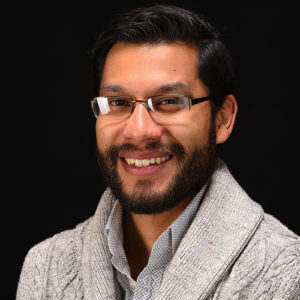 November 4, 2021
November 4, 2021
Benjamin Villarreal, an English professor at New Mexico Highlands University, has been awarded a faculty fellowship by the American Association of Hispanics in Higher Education, or AAHHE.
The national fellowship is intended for Hispanic tenure-track faculty in order to provide support in career goals, build community, and foster faculty fellow leadership.
The group of faculty fellows meets once a month and will culminate in an annual conference that will take place in March 2022. Villarreal said he learned about the fellowship from a colleague and was interested in learning with and from pre-tenure Latinx scholars from universities across the country.
“The big thing for me is the mentoring aspect of going up for tenure and getting extra advice and ideas for how to prepare for that process,” said Villarreal. “The other aspect is building this network and learning about what other scholars are working on in their research and their classroom teaching, and learning from them, but also hoping that these are new members of an academic family.”
Villarreal said he identifies as Chicano and feels that representation in academia is important for all students.
“It’s about students, regardless of their identity, being able to see themselves represented in their faculty and their administration at their places of education,” said Villarreal. “The other part of it is also students getting to learn from diverse educators who come from different backgrounds and learning about different cultural points of view.”
According to Villarreal, the AAHHE fellowship helps to ensure that there are more Hispanic faculty in leadership roles at colleges and universities across the U.S.
“What does it mean to serve Hispanic students?,” said Villarreal. “Part of it is recognizing that ‘Hispanic’ is such a broad category, so how we serve Hispanic students doesn’t have a single answer. Being a part of a fellowship like this, where I get to learn with and from faculty from all these other institutions, I think helps complicate that notion, which hopefully enables us to find the multiple answers to that question.”
For Villarreal, representation can inspire students and show them what is possible for their goals and career aspirations.
“I had very few Latinx teachers over my educational career,” said Villarreal. “It makes a difference because when you see yourself represented in different circles, it makes existing in that circle seem possible, whether it’s higher education, or a field of study, or popular culture or media.”
Villarreal said he loves to teach because he loves to learn and that his students are constantly helping him discover new perspectives or ways of thinking.
“The other thing I really love about teaching is that it’s something that we’re doing together—it’s a bunch of us and we’re sitting down and we’re looking at a text together,” said Villarreal. “Just by the nature of that practice, we’re going to come to understandings we can’t come to by ourselves, and I think that’s exciting.”
Brandon Kempner, dean of the college of the arts and sciences, said Villarreal brings great enthusiasm and innovation into the classroom.
“This fellowship will help Dr. Villarreal build on the strengths he already brings as a teacher,” said Kempner. “As a former NMHU student, he is an important role model for our students to show how they can achieve academic excellence.”
Villarreal said that although the fellowship has just begun, he feels like he has already started to build community with his cohort of AAHHE faculty fellows
“I think academia by its nature can sometimes be very isolating because a lot of research is done independently and a lot of writing is done independently,” said Villarreal. “Anytime you can, as an educator, get together with others and reflect on your practices and experiences and research, that’s a good thing because we can figure out how to make it better.”
